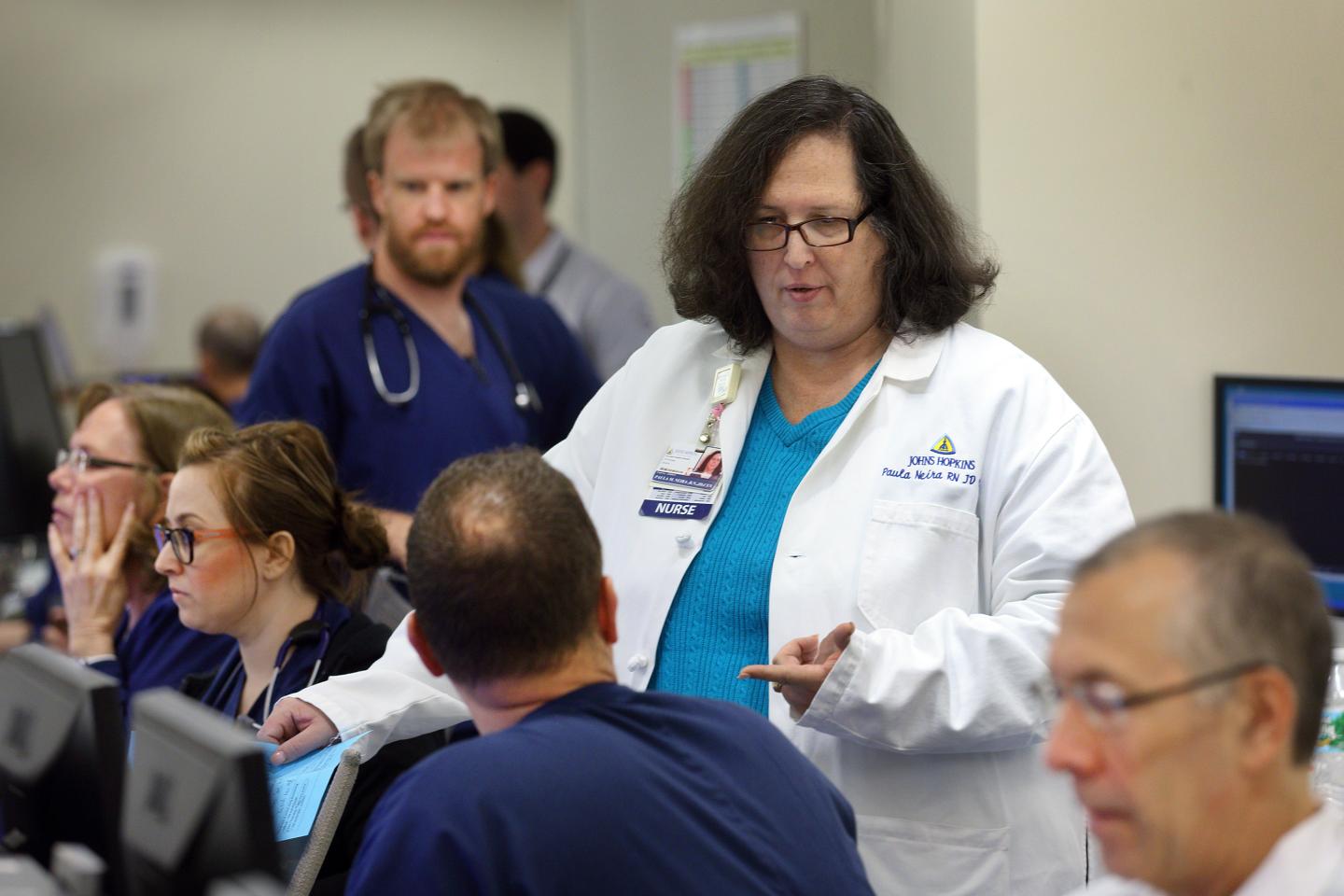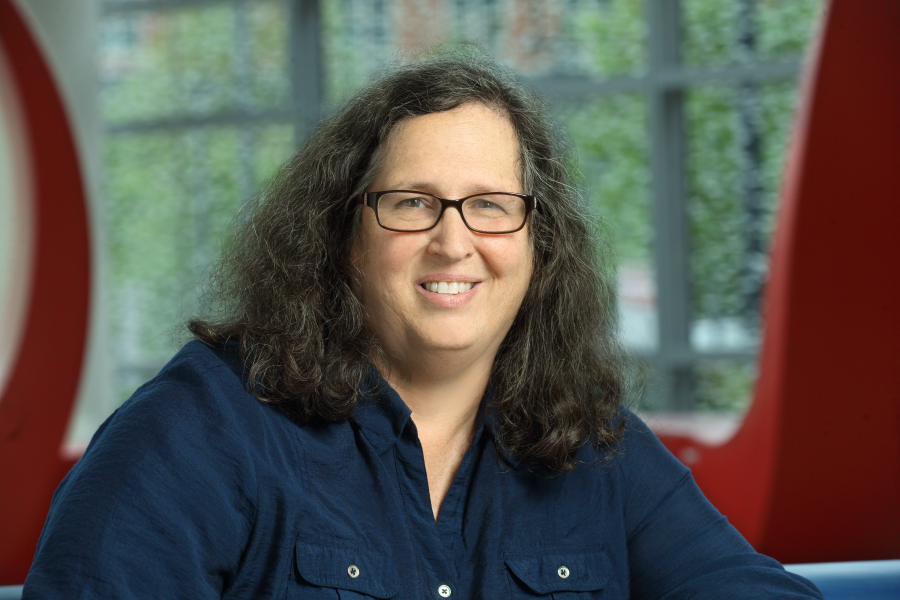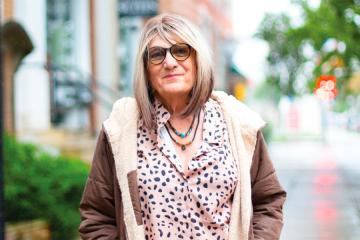Paula Neira never imagined doing anything other than serving her country as an officer in the United States Navy. At age 9, the moment she saw the bow of a Navy destroyer gliding through the still waters of New York Harbor, she told her father, "I want to be part of that."
Neira went on to graduate with distinction from the U.S. Naval Academy in 1985 and serve as a surface warfare officer during the Gulf War's Operation Desert Storm. But in 1991, "with the 30-year movie of my life playing out as planned, I made the hardest decision I've ever made," she says. "I left the Navy."
Assigned male at birth, Neira had long identified as a woman but kept that side of herself a secret to pursue her dream of military service to her country. But as she neared 30, she couldn't continue hiding. "I could serve my country or I could live an authentic life," she says of the battle she waged internally for years before opting to undergo gender-affirmation surgery.
Today, Paula Neira is the program director of LGBTQ+ Equity and Education at Johns Hopkins Medicine, where she leads efforts to foster and achieve health equity for those underrepresented in medicine, science, nursing, and health care administration. Her life is richer and more service oriented than the path she first mapped out for herself and followed. "Through all of this, I've realized that my calling to serve, my purpose, was much broader and deeper than just being a Navy officer," she says.
Now, as an openly transgender woman, Neira is looking back on her upbringing and military career—plus the work she's done since as a nurse, attorney, diversity advocate, and university administrator. She's hoping to use her story to help others struggling to live authentically, while imparting lessons on the harm that can come from discriminatory practices, policies, and belief systems. She appears in a new documentary film, Serving in Secret: Love, Country, and Don't Ask, Don't Tell, which aired Sunday night on MSNBC. The documentary is part of a larger series, The Turning Point—produced by Daily Show host Trevor Noah—that explores large issues such as human rights, civil rights, and democracy.
Serving in Secret, which premiered earlier this month at the Johns Hopkins University Bloomberg Center in Washington, D.C., tells the story of Tom Carpenter, a Naval Academy graduate and Marine Corps aviator who helped lead the landmark repeal of the U.S. military's Don't Ask, Don't Tell (DADT) policy that banned openly gay, lesbian, and bisexual individuals from serving in the armed forces from 1994 to 2011. Neira played a leadership role in the policy's repeal and shares some of her experiences in the documentary.
"How could the military claim to be based on courage and honor, when it was asking people to hide in the closet and lie?" Neira asks. "It didn't add up."
A mindset instilled in childhood
Growing up in Jersey City, Neira learned to value service and duty above all else. Her father served as a private, or E-1, in World War II, "the lowest rank you can have in the Army," Neira says. "My dad wasn't ambitious about being promoted, but he was the proudest E-1 you'll ever meet, and always proud to have served his country."
At home, Neira's parents stressed the importance of working hard and giving back. "If you've been blessed with talent and ability, you've got an obligation to help other people and be committed to something beyond yourself—this is what my parents instilled in me," she says. The acclaimed, all-male Jesuit high school Neira attended, Regis High School, on the Upper East Side of Manhattan, drilled this mindset deeper. Founded on the Ignatian principle of "men for others," the Jesuit school further ingrained in Neira an aspiration to join the Navy and lead a service-oriented life.
Yet at the same time Neira embraced these ideals, she knew she didn't precisely fit the mold. "I played with G.I. Joes and wasn't effeminate growing up, but I felt like I was different in a way that I didn't have words for," she says.
Her light-bulb moment came, she says, while watching CBS News one evening in the mid-1970s, as anchorman John Tesh told the story of Renée Richards, a transgender tennis professional fighting for her right to compete as a woman in the 1976 U.S. Open. "That's when I first heard the word 'transexual,' and that's when I finally had a word to define how I felt about my gender," Neira says.
She first shared her new awareness with her mom, who considered the idea revolting. "I learned from my mom's reaction that whatever I was in that moment, it was bad, it was not the right thing to be," Neira says. With no one to turn to, she buried her feelings and didn't begin to address them until years later.
An internal battle
When Neira earned a spot at the prestigious U.S. Naval Academy in Annapolis, Maryland, she knew she was doing the right thing: building a life bound by service and duty to the greater good. But even as she graduated with honors (in 1985) and rose through the ranks to become a Navy officer, a conflict simmered inside of her that she couldn't resolve.
"It was an ongoing private conversation about 'Hey, who am I?'" Neira says. "I learned to compartmentalize things and say, 'I'm not going to deal with this right now. I'm just going to ignore it.'"
Coming out as a woman would result in an automatic discharge from the military, which banned transgender individuals until 2016 and even as recently as 2017, when the Trump administration attempted to reimpose a ban on transgender service. "I would sit on the beaches outside of Charleston, South Carolina, where I lived, and cry as I watched ships coming and going," Neira says about her time spent weighing options.
Then, on a day Neira will never forget—Nov. 15, 1991—she turned down an opportunity to remain on active duty and resigned from the Navy, making "the most traumatic decision I've ever made," she says.
This time, "when I told my mom, she accepted and loved me but blamed herself, believing she had done something wrong to cause this."
Shifting her path
Building a life after the Navy wasn't easy, but she held firm to her belief that she could find a purpose-driven career, as she embarked on the medical and social sides of the gender-affirmation process to live openly as a woman. Her journey took her first to nursing school and nursing positions in emergency care and trauma resuscitation. There, she served others in an arena not unlike the adrenaline-fueled environment of the military. But her work as a nurse opened her eyes to the power dynamics that can exist between doctors and nurses. "I realized that nurses are often not given a seat at the table," Neira says. "I wanted my voice to be heard."

Image credit: Keith Weller / Johns Hopkins Medicine
So Neira enrolled in law school and then worked as a staff attorney for the Servicemembers Legal Defense Network (SLDN), now known as the Modern Military Association of America. Over time, she served on SLDN's board of directors and as co-chair of its Military Advisory Committee, leading efforts to reverse discriminatory policies and practices in the military, including the repeal of Don't Ask, Don't Tell.
The origins of Don't Ask, Don't Tell in the U.S. stretch back to the Revolutionary War, "when the first person was kicked out of the military for being gay," Neira explains. "What follows are various iterations of that discriminatory act—the criminalization of homosexual conduct during the Great War, the ban on transgender people in the 1960s, DADT in the '90s, which led to around 14,000 people being removed from service, and on we go."
When Congress voted to make Don't Ask, Don't Tell an official policy in 1993 under the Clinton administration, Neira stayed out of the protests. "At the time, I was dealing with my own gender identity and didn't want people to conflate that with sexual orientation, which is different, or to use me as a rationale for their bigotry," she says.
But Neira always knew the policy was wrong and welcomed the chance to help overturn it 17 years later, in 2010, through her role at SLDN. In theory, "the policy meant that the military would stop doing witch hunts and that gay folks wouldn't be harassed, but it was never implemented that way," Neira says. "A lot of people made coming out statements that they voluntarily shared, and that's why they got kicked out—but only after, in many cases, being threatened or interrogated."
Essentially, the policy asked people "to compromise their honor by either lying by omission or commission to be able to serve their country," Neira says. "That's not right to ask of anybody."
Lessons learned, purpose harnessed
Neira stayed close to her parents and even held them in her arms as they lay dying, she says. But she also learned to build a family and support system outside of her biological family, she adds, made up of people who accept her fully.
Overcoming the hurt and trauma that hit her when she left the Navy took time and came with consequences. "One of my coping mechanisms in the '90s was to allow myself to get out of shape so I couldn't meet the standards for serving in the military," she says. "I gained weight and developed type 2 diabetes. [In addition,] because of the military culture's view that asking for help with emotional or psychological issues is a weakness, it took me 27 years to give myself permission to get help dealing with the trauma of the end of my naval career."
At age 60, in her current role at Johns Hopkins Medicine, where she works to reduce health disparities and develop policies and programs that promote diversity, equity, and inclusion, Neira doesn't just advocate for people who share her demographics as a white transgender woman with a female partner. "People think I'm motivated to do what I do because I'm a member of the LGBTQ+ communities," she says. "Without sounding corny about it, I do it for the oath I took when I got inducted into the Naval Academy and swore I would support, defend, and bear true faith and allegiance to the Constitution.
"When people are unable to get the health care they need, when they're denied evidence-based medical treatment that is necessary to their health and well-being, simply because of somebody else's ignorance, prejudice, and hate, that offends the Constitution, and I swore I would do something about it."
At Johns Hopkins, Neira lectures nationally on DEI-related topics, including the need to improve transgender cultural awareness in health care. "In my talks and conversations, I make the point that we're all made up of so many different dimensions," Neira says. "None of us are one thing only. For me, my sexual orientation and gender identity are as important as my eye color. They're part of who I am. I don't deny them. I'm not ashamed of them. But there's more to me than those two things."
Her position at Hopkins involves working as a liaison to the Johns Hopkins Center for Transgender and Gender Expansive Health, for which Neira previously served as clinical program director. The center opened in 2017 and provides gender-affirming treatment, including surgeries, across Johns Hopkins Medicine, with experts from plastic and reconstructive surgery working with endocrinologists, dermatologists, mental health care providers, and other specialists to offer holistic care.
Neira is also making history. In 2015, she was the first transgender woman for whom the Navy, on its own volition, updated her discharge documentation to reflect her proper name. In 2020, she became the first graduate of a U.S. service academy inducted as a fellow into the American Academy of Nursing. And in 2021, she co-sponsored and christened the USNS Harvey Milk, the first ship in Navy history named for an openly LGBTQ+ person—in this case, the civil rights icon and San Francisco politician Harvey Milk, "whose own naval career was ended due to anti-gay animus in the 1950s, and who was assassinated in 1978," Neira says.
Forty-two years after she first enrolled in the Naval Academy, and despite traveling an unexpected path dotted with obstacles and hard-won triumphs, Neira emerges as a profoundly insightful woman who continues to fulfill the duty that first drew her to the military. "My plan was 30 years in the Navy—that was the movie I was supposed to live," she says. "But I've been blessed and privileged to find meaning and purpose, to give back and serve, at a level I never imagined."
Posted in Voices+Opinion
Tagged diversity, health disparities, lgbtq life, center for transgender health









